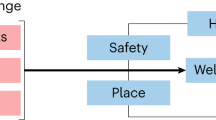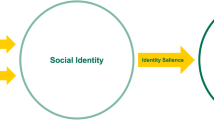Abstract
A frequent suggestion to increase individuals' willingness to take action on climate change and to support relevant policies is to highlight its proximal consequences, that is, those that are close in space and time. But previous studies that have tested this proximizing approach have not revealed the expected positive effects on individual action and support for addressing climate change. We present three lines of psychological reasoning that provide compelling arguments as to why highlighting proximal impacts of climate change might not be as effective a way to increase individual mitigation and adaptation efforts as is often assumed. Our contextualization of the proximizing approach within established psychological research suggests that, depending on the particular theoretical perspective one takes on this issue, and on specific individual characteristics suggested by these perspectives, proximizing can bring about the intended positive effects, can have no (visible) effect or can even backfire. Thus, the effects of proximizing are much more complex than is commonly assumed. Revealing this complexity contributes to a refined theoretical understanding of the role that psychological distance plays in the context of climate change and opens up further avenues for future research and for interventions.
This is a preview of subscription content, access via your institution
Access options
Subscribe to this journal
Receive 12 print issues and online access
$209.00 per year
only $17.42 per issue
Buy this article
- Purchase on Springer Link
- Instant access to full article PDF
Prices may be subject to local taxes which are calculated during checkout
Similar content being viewed by others
References
Bord, R. J., Fisher, A. & O'Connor, R. E. Public perceptions of global warming: United States and international perspectives. Clim. Res. 11, 75–84 (1998).
Lorenzoni, I., Leiserowitz, A., De Franca Doria, M., Poortinga, W. & Pidgeon, N. F. Cross-national comparisons of image associations with 'global warming' and 'climate change' among laypeople in the United States of America and Great Britain. J. Risk Res. 9, 265–281 (2006).
Lorenzoni, I., Nicholson-Cole, S. & Whitmarsh, L. Barriers perceived to engaging with climate change among the UK public and their policy implications. Glob. Environ. Change 17, 445–459 (2007).
Lorenzoni, I. & Pidgeon, N. F. Public views on climate change: European and USA perspectives. Clim. Change 77, 73–95 (2006).
Milfont, T. L. in Psychological Approaches to Sustainability: Current Trends in Theory, Research and Practice (eds Corral-Verdugo, V., García-Cadena, C. H. & Frías-Arment, M.) 19–42 (Nova Science, 2010).
O'Neill, S. & Nicholson-Cole, S. 'Fear won't do it': Promoting positive engagement with climate change through visual and iconic representations. Sci. Commun. 30, 355–379 (2009).
Leiserowitz, A. Climate change risk perception and policy preferences: The role of affect, imagery, and values. Clim. Change 77, 45–72 (2006).
The World Bank. Public Attitudes Toward Climate Change: Findings from a Multi-Country Poll. at http://siteresources.worldbank.org/INTWDR2010/Resources/Background-report.pdf (2009).
Floyd, D. L., Prentice-Dunn, S. & Rogers, R. W. A meta-analysis of research on protection motivation theory. J. Appl. Soc. Psychol. 30, 407–429 (2000).
Zaalberg, R., Midden, C. J. H., Meijnders, A. & McCalley, T. Prevention, adaptation, and threat denial: Flooding experiences in the Netherlands. Risk Anal. 29, 1759–1778 (2009).
Witte, K. & Allen, M. A meta-analysis of fear appeals: Implications for effective public health campaigns. Health Educ. Behav. 27, 591–615 (2000).
Brody, S. D., Grover, H. & Vedlitz, A. Examining the willingness of Americans to alter behaviour to mitigate climate change. Clim. Policy 12, 1–22 (2012).
Brügger, A., Morton, T. A. & Dessai, S. Hand in hand: Public endorsement of climate change mitigation and adaptation. PLoS ONE 10, e0124843 (2015).
Dietz, T., Dan, A. & Shwom, R. Support for climate change policy: Social psychological and social structural influences. Rural Sociol. 72, 185–214 (2007).
Nicholson-Cole, S. Representing climate change futures: A critique on the use of images for visual communication. Comput. Environ. Urban Syst. 29, 255–273 (2005).
Weber, E. U. Experience-based and description-based perceptions of long-term risk: Why global warming does not scare us (yet). Clim. Change 77, 103–120 (2006).
Leviston, Z., Price, J. & Bishop, B. Imagining climate change: The role of implicit associations and affective psychological distancing in climate change responses. Eur. J. Soc. Psychol. 44, 441–454 (2014).
Moser, S. C. Communicating climate change: History, challenges, process and future directions. Wiley Interdiscip. Rev. Clim. Change 1, 31–53 (2010).
Hulme, M. Geographical work at the boundaries of climate change. Trans. Inst. Br. Geogr. 33, 5–11 (2008).
Kerr, R. A. Amid worrisome signs of warming, 'climate fatigue' sets in. Science 326, 926–928 (2009).
Cap, P. Proximization: The Pragmatics of Symbolic Distance Crossing (John Benjamins, 2013).
Evans, L., Milfont, T. L. & Lawrence, J. Considering local adaptation increases willingness to mitigate. Glob. Environ. Change 25, 69–75 (2014).
Ebi, K. L. & Semenza, J. C. Community-based adaptation to the health impacts of climate change. Am. J. Prev. Med. 35, 501–507 (2008).
Shwom, R., Dan, A. & Dietz, T. The effects of information and state of residence on climate change policy preferences. Clim. Change 90, 343–358 (2008).
Scannell, L. & Gifford, R. Personally relevant climate change: The role of place attachment and local versus global message framing in engagement. Environ. Behav. 45, 60–85 (2013).
Spence, A., Poortinga, W., Butler, C. & Pidgeon, N. F. Perceptions of climate change and willingness to save energy related to flood experience. Nature Clim. Change 1, 46–49 (2011).
Reser, J. P., Bradley, G. L. & Ellul, M. C. Encountering climate change: 'Seeing' is more than 'believing'. Wiley Interdiscip. Rev. Clim. Change 5, 521–537 (2014).
Spence, A., Poortinga, W. & Pidgeon, N. F. The psychological distance of climate change. Risk Anal. 32, 957–972 (2012).
Frederick, S., Loewenstein, G. & O'Donoghue, T. Time discounting and time preference: A critical review. J. Econ. Lit. 40, 351–401 (2002).
Hardisty, D. J. & Weber, E. U. Discounting future green: Money versus the environment. J. Exp. Psychol. Gen. 138, 329–340 (2009).
Devine-Wright, P. Think global, act local? The relevance of place attachments and place identities in a climate changed world. Glob. Environ. Change 23, 61–69 (2013).
Hulme, M., Dessai, S., Lorenzoni, I. & Nelson, D. R. Unstable climates: Exploring the statistical and social constructions of 'normal' climate. Geoforum 40, 197–206 (2009).
Weber, E. U. What shapes perceptions of climate change? Wiley Interdiscip. Rev. Clim. Change 1, 332–342 (2010).
Lujala, P., Lein, H. & Rød, J. K. Climate change, natural hazards, and risk perception: The role of proximity and personal experience. Local Environ. 20, 489–509 (2015).
Taylor, A., de Bruin, W. B. & Dessai, S. Climate change beliefs and perceptions of weather-related changes in the United Kingdom. Risk Anal. 34, 1995–2004 (2014).
Van der Linden, S. On the relationship between personal experience, affect and risk perception: The case of climate change. Eur. J. Soc. Psychol. 44, 430–440 (2014).
Dessai, S. & Sims, C. Public perception of drought and climate change in southeast England. Environ. Hazards 9, 340–357 (2010).
Whitmarsh, L. Are flood victims more concerned about climate change than other people? The role of direct experience in risk perception and behavioural response. J. Risk Res. 11, 351–374 (2008).
Hamilton, L. C. & Keim, B. D. Regional variation in perceptions about climate change. Int. J. Climatol. 29, 2348–2352 (2009).
Reser, J. P., Bradley, G. L., Glendon, A. I., Elul, M. C. & Callaghan, R. Public Risk Perceptions, Understandings and Responses to Climate Change and Natural Disasters in Australia: 2010–2011. http://www.nccarf.edu.au/publications/public-risk-perceptions-second-survey (2012).
Reser, J. P., Bradley, G. L., Glendon, A. I., Elul, M. C. & Callaghan, R. Public Risk Perceptions, Understandings and Responses to Climate Change in Australia and Great Britain. http://www.nccarf.edu.au/publications/public-risk-perceptions-final (2012).
Akerlof, K., Maibach, E. W., Fitzgerald, D., Cedeno, A. Y. & Neuman, A. Do people 'personally experience' global warming, and if so how, and does it matter? Glob. Environ. Change 23, 81–91 (2013).
Blennow, K., Persson, J., Tomé, M. & Hanewinkel, M. Climate change: Believing and seeing implies adapting. PLoS ONE 7, e50182 (2012).
Myers, T. A., Maibach, E. W., Roser-Renouf, C., Akerlof, K. & Leiserowitz, A. A. The relationship between personal experience and belief in the reality of global warming. Nature Clim. Change 3, 343–347 (2013).
McCright, A. M., Dunlap, R. E. & Xiao, C. The impacts of temperature anomalies and political orientation on perceived winter warming. Nature Clim. Change 4, 1077–1081 (2014).
Capstick, S. B. & Pidgeon, N. F. Public perception of cold weather events as evidence for and against climate change. Clim. Change 122, 695–708 (2014).
Zehr, S. The sociology of global climate change. Wiley Interdiscip. Rev. Clim. Change 6, 129–150 (2015).
Risen, J. L. & Critcher, C. R. Visceral fit: While in a visceral state, associated states of the world seem more likely. J. Pers. Soc. Psychol. 100, 777–793 (2011).
Lewandowski, G. W. J., Ciarocco, N. J. & Gately, E. L. The effect of embodied temperature on perceptions of global warming. Curr. Psychol. 31, 318–324 (2012).
Joireman, J., Truelove, H. B. & Duell, B. Effect of outdoor temperature, heat primes and anchoring on belief in global warming. J. Environ. Psychol. 30, 358–367 (2010).
Zaval, L., Keenan, E. A., Johnson, E. J. & Weber, E. U. How warm days increase belief in global warming. Nature Clim. Change 4, 143–147 (2014).
Spence, A. & Pidgeon, N. F. Framing and communicating climate change: The effects of distance and outcome frame manipulations. Glob. Environ. Change 20, 656–667 (2010).
Trope, Y. & Liberman, N. Construal-level theory of psychological distance. Psychol. Rev. 117, 440–463 (2010).
Ledgerwood, A., Trope, Y. & Chaiken, S. Flexibility now, consistency later: Psychological distance and construal shape evaluative responding. J. Pers. Soc. Psychol. 99, 32–51 (2010).
Ledgerwood, A., Wakslak, C. J. & Wang, M. A. Differential information use for near and distant decisions. J. Exp. Soc. Psychol. 46, 638–642 (2010).
Eyal, T., Sagristano, M. D., Trope, Y., Liberman, N. & Chaiken, S. When values matter: Expressing values in behavioral intentions for the near vs. distant future. J. Exp. Soc. Psychol. 45, 35–43 (2009).
Fujita, K., Clark, S. L. & Freitas, A. L. in Encouraging Sustainable Behavior: Psychology and the Environment (ed. van Trijp, H. C. M.) 81–100 (Psychology Press, 2014).
Corner, A., Markowitz, E. & Pidgeon, N. F. Public engagement with climate change: The role of human values. Wiley Interdiscip. Rev. Clim. Change 5, 411–422 (2014).
Gifford, R. The dragons of inaction: Psychological barriers that limit climate change mitigation and adaptation. Am. Psychol. 66, 290–302 (2011).
Altman, I. & Low, S. M. Place attachment. (Plenum, 1992).
Devine-Wright, P., Price, J. & Leviston, Z. My country or my planet? Exploring the influence of multiple place attachments and ideological beliefs upon climate change attitudes and opinions. Glob. Environ. Change 30, 68–79 (2015).
Lewicka, M. On the varieties of people's relationships with places Hummon's typology revisited. Environ. Behav. 43, 676–709 (2011).
Devine-Wright, P. & Howes, Y. Disruption to place attachment and the protection of restorative environments: A wind energy case study. J. Environ. Psychol. 30, 271–280 (2010).
Scannell, L. & Gifford, R. Defining place attachment: A tripartite organizing framework. J. Environ. Psychol. 30, 1–10 (2010).
Brügger, A., Kaiser, F. G. & Roczen, N. One for all? Connectedness to nature, inclusion of nature, environmental identity, and implicit association with nature. Eur. Psychol. 16, 324–333 (2011).
Hartig, T., Kaiser, F. G. & Bowler, P. A. Psychological restoration in nature as a positive motivation for ecological behavior. Environ. Behav. 33, 590–607 (2001).
Buchan, N. R. et al. Global social identity and global cooperation. Psychol. Sci. 22, 821–828 (2011).
Tu, L., Khare, A. & Zhang, Y. A short 8-item scale for measuring consumers' local–global identity. Int. J. Res. Mark. 29, 35–42 (2012).
Jonas, E. et al. in Advances in Experimental Social Psychology Vol. 49 (eds Olson, J. M. & Zanna, M. P.) 219–286 (Academic, 2014).
Proulx, T., Inzlicht, M. & Harmon-Jones, E. Understanding all inconsistency compensation as a palliative response to violated expectations. Trends Cogn. Sci. 16, 285–291 (2012).
IPCC. Climate Change 2014: Impacts, Adaptation, and Vulnerability. Part A: Global and Sectoral Aspects (eds Field, C. B. et al.) (Cambridge Univ. Press, 2014).
IPCC. Climate Change 2014: Impacts, Adaptation, and Vulnerability. Part B: Regional Aspects (eds Barros, V. R. et al.) (Cambridge Univ. Press, 2014).
Doulton, H. & Brown, K. Ten years to prevent catastrophe? Discourses of climate change and international development in the UK press. Glob. Environ. Change 19, 191–202 (2009).
Boykoff, M. T. The cultural politics of climate change discourse in UK tabloids. Polit. Geogr. 27, 549–569 (2008).
Truelove, H. B. & Parks, C. Perceptions of behaviors that cause and mitigate global warming and intentions to perform these behaviors. J. Environ. Psychol. 32, 246–259 (2012).
Whitmarsh, L. Behavioural responses to climate change: Asymmetry of intentions and impacts. J. Environ. Psychol. 29, 13–23 (2009).
Maio, G. R. et al. Social psychological factors in lifestyle change and their relevance to policy. Soc. Issues Policy Rev. 1, 99–137 (2007).
Marshall, N. A., Fenton, D. M., Marshall, P. A. & Sutton, S. G. How resource dependency can influence social resilience within a primary resource industry. Rural Sociol. 72, 359–390 (2007).
Brody, S. D., Zahran, S., Vedlitz, A. & Grover, H. Examining the relationship between physical vulnerability and public perceptions of global climate change in the United States. Environ. Behav. 40, 72–95 (2008).
Moser, S. C. in Creating a Climate for Change: Communicating Climate Change and Facilitating Social Change (eds Moser, S. C. & Dilling, L.) 64–80 (Cambridge Univ. Press, 2007).
Kunda, Z. The case for motivated reasoning. Psychol. Bull. 108, 480–498 (1990).
Sweeny, K., Melnyk, D., Miller, W. & Shepperd, J. A. Information avoidance: Who, what, when, and why. Rev. Gen. Psychol. 14, 340 (2010).
Good, A. & Abraham, C. Measuring defensive responses to threatening messages: A meta-analysis of measures. Health Psychol. Rev. 1, 208–229 (2007).
Poortinga, W., Spence, A., Whitmarsh, L., Capstick, S. & Pidgeon, N. F. Uncertain climate: An investigation into public scepticism about anthropogenic climate change. Glob. Environ. Change 21, 1015–1024 (2011).
Gosling, P., Denizeau, M. & Oberle, D. Denial of responsibility: A new mode of dissonance reduction. J. Pers. 90, 722–733 (2006).
Shepherd, S. & Kay, A. C. On the perpetuation of ignorance: System dependence, system justification, and the motivated avoidance of sociopolitical information. J. Pers. Soc. Psychol. 102, 264–280 (2012).
Feinberg, M. & Willer, R. Apocalypse soon? Dire messages reduce belief in global warming by contradicting just-world beliefs. Psychol. Sci. 22, 34–38 (2011).
Feygina, I., Jost, J. T. & Goldsmith, R. E. System justification, the denial of global warming, and the possibility of 'system-sanctioned change'. Pers. Soc. Psychol. Bull. 36, 326–338 (2010).
Butler, C. Morality and climate change: Is leaving your TV on standby a risky behaviour? Environ. Values 19, 169–192 (2010).
Knowles, E. D., Lowery, B. S., Chow, R. M. & Unzueta, M. M. Deny, distance, or dismantle? How white Americans manage a privileged identity. Perspect. Psychol. Sci. 9, 594–609 (2014).
Ferguson, M. A. & Branscombe, N. R. Collective guilt mediates the effect of beliefs about global warming on willingness to engage in mitigation behavior. J. Environ. Psychol. 30, 135–142 (2010).
Steele, C. M. in Advances in Experimental Social Psychology Vol. 21 (ed. Berkowitz, L.) 261–302 (Academic, 1988).
Hugh-Jones, S. & Madill, A. The air's got to be far cleaner here: A discursive analysis of place-identity threat. Br. J. Soc. Psychol. 48, 601–624 (2009).
Devine-Wright, P. Rethinking NIMBYism: The role of place attachment and place identity in explaining place-protective action. J. Community Appl. Soc. Psychol. 19, 426–441 (2009).
Jost, J. T. & Hunyady, O. Antecedents and consequences of system-justifying ideologies. Curr. Dir. Psychol. Sci. 14, 260–265 (2005).
Weintrobe, S. Engaging with Climate Change: Psychoanalytic and Interdisciplinary Perspectives (Routledge, 2013).
O'Keefe, D. J. in The Persuasion Handbook: Developments in Theory and Practice (eds Dillard, J. P. & Pfau, M.) (SAGE, 2002).
Sherman, D. K. & Cohen, G. L. in Advances in Experimental Social Psychology (ed. Zanna, M. P.) 38, 183–242 (Academic, 2006).
Basil, D. Z., Ridgway, N. M. & Basil, M. D. Guilt appeals: The mediating effect of responsibility. Psychol. Mark. 23, 1035–1054 (2006).
Acknowledgements
A.B. was supported by a grant from the Swiss National Science Foundation (P2SKP1_158706). S.D. was supported by the European Research Council under the 7th Framework Programme (FP7/2007-2013)/ERC Grant agreement no. 284369 and by the UK Economic and Social Research Council (ESRC) for the Centre for Climate Change Economics and Policy (CCCEP).
Author information
Authors and Affiliations
Contributions
A.B. wrote the first draft of the paper. All authors commented on the paper and refined it in response to the peer reviews.
Corresponding author
Ethics declarations
Competing interests
The authors declare no competing financial interests.
Rights and permissions
About this article
Cite this article
Brügger, A., Dessai, S., Devine-Wright, P. et al. Psychological responses to the proximity of climate change. Nature Clim Change 5, 1031–1037 (2015). https://doi.org/10.1038/nclimate2760
Received:
Accepted:
Published:
Issue Date:
DOI: https://doi.org/10.1038/nclimate2760
This article is cited by
-
A causal link between mental imagery and affect-laden perception of climate change related risks
Scientific Reports (2023)
-
Shaping farmers’ beliefs, risk perception and adaptation response through Construct Level Theory in the southwest Iran
Scientific Reports (2023)
-
Do Flood and Heatwave Experiences Shape Climate Opinion? Causal Evidence from Flooding and Heatwaves in England and Wales
Environmental and Resource Economics (2023)
-
Individual and community perceptions of climate change in Lower Mustang, Nepal
Environment, Development and Sustainability (2023)
-
Adaptation, flourishing, and the importance of place
Regional Environmental Change (2023)



